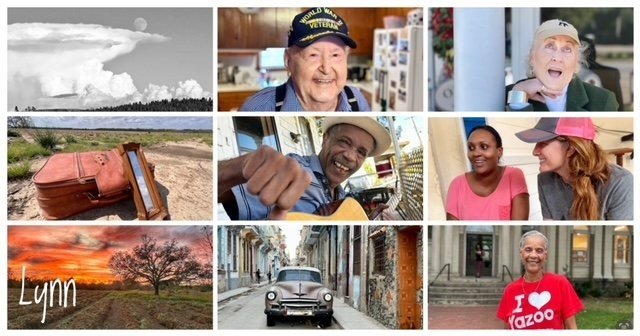Oaklawn
"We Loved You" were the only visible words on the gravestone overturned by tree roots in the back of St. Austin cemetery. Pushing aside the thorny vines and a Modelo beer bottle wrapped in a rotting brown paper bag, I dug through layers of leaves, dirt, and worms to find the name, Carrie C. Brown. She was born on October 18, 1901, the year Theodore Roosevelt became president. She died on November 29, 1976, the year Apple Computer was born in Steve Jobs' garage.
Volunteers swung machetes to clear a path to the graves. The overgrown cemetery in Toulminville is hidden by trees, vines, and undergrowth. The men yelled "watch your step" around sunken plots, hidden headstones, and cracked concrete slabs revealing caskets inside.
"This is how Oaklawn looked before we started clearing it out in 2017," said Bill Atkeison with Veterans Memorial Recovery Team. The Vietnam veteran is also Mobile's Veteran of the Year. Slashing the vines and branches, he calmly says, "good dogs" to the two fenced Rottweilers running and barking as we walk by.
"These cemeteries became jungles when no one cared for them," Atkeison said. "Mother Nature comes back and wins."
Eddie Irby, members of Veterans Memorial Recovery Team, volunteers Georgeann and Jim Ellis, and other military and service organizations have worked for three years clearing out Oaklawn, another African American cemetery a few blocks away. They place American flags beside the headstones of veterans and record all graves in Find-A-Grave, making it easier for friends and families to find the ones they love. Many acres are still uncleared and thousands of graves are still unfound.
St. Austin and Oaklawn have been final resting places for almost 100 years, but the current owner is unknown. There is no one to blame for the conditions of the cemeteries. No business to force into accountability. Upkeep is the responsibility of families, not perpetual care.
At Oaklawn, the front sections are mostly cleared. Graves are shaded by mulberry, juniper, crepe myrtle, and oak trees. Dragonflies dart along the breeze and the property stretches to a stream feeding into Three Mile Creek.
Some graves are inscribed with "Beloved." "Though lost to sight, the memory remains." "Gone to the Great Beyond."
They give the titles of "Wife," "Mother" or "Father," but say nothing about the life lived between birth and death. What happened between sunrise and sunset?
One of the earliest births in Oaklawn belongs to Harriet Allen Nichols. She was born on August 28, 1868, three years after slavery was abolished. It was also the year Alabama was readmitted into the Union. She died Sept. 6, 1941, on the day Jews over the age of six in German territories were ordered to wear a star, and three months before the bombing of Pearl Harbor. She grew up with the laws of Jim Crow and saw the invention of airplanes and automobiles.
Annie Maddox was born in 1891 and died in 1975. Mack Henderson born in 1896 and died in 1971, the year after I was born.
How did Harriet, Annie, and Mack adjust as the world changed? Are their names passed down through the family? What did their children and grandchildren inherit from them? Their eyes? Their strength? Family recipes?
Many graves are marked with World War I. World War II. Korea. Vietnam. Some were Buffalo Soldiers and Tuskegee Airmen. How did Mobile treat these men when they returned from war? How did they leave behind the death of war and step forward into the rest of their lives?
A man cutting grass in his yard across the street walked over to give me a Gatorade, making sure I was okay. He grew up here and told stories of catching bullfrogs and rabbits in the cemetery. His family gathered blackberries and pecans and picked apples and oranges from the trees. He said the neighborhood surrounding Oaklawn was once full of life. Men like his father were seamen or worked at Brookley Field. On Mother's and Father's Day, the cemetery was filled with families pushing lawnmowers and caring for graves. But times changed and everyone moved away.
One grave reads, "The heart that truly loves never forgets."
The heart may truly love, but pieces of Mobile history could be forgotten if Mother Nature reclaims this land. From Civil Rights leaders to educators. From doctors and musicians to Mardi Gras Queens. From grandparents to grandchildren. Their bodies are buried, but their names and stories should live on.
As I drove away from Oaklawn, I listened to President Obama's eulogy for John Lewis. He said, "If you don't do everything you can to change things, then they will remain the same. You only pass this way once. You have to give it all you have."
That is the lesson of cemeteries. You only pass this way once. Now is the time to give it all you have.
I am working on stories about Oaklawn and St. Austin for Lagniappe, Alabama Public Radio, and Our Southern Souls. If you know the history of the cemeteries or the neighborhoods or want to share memories of family members buried there, please let me know.






